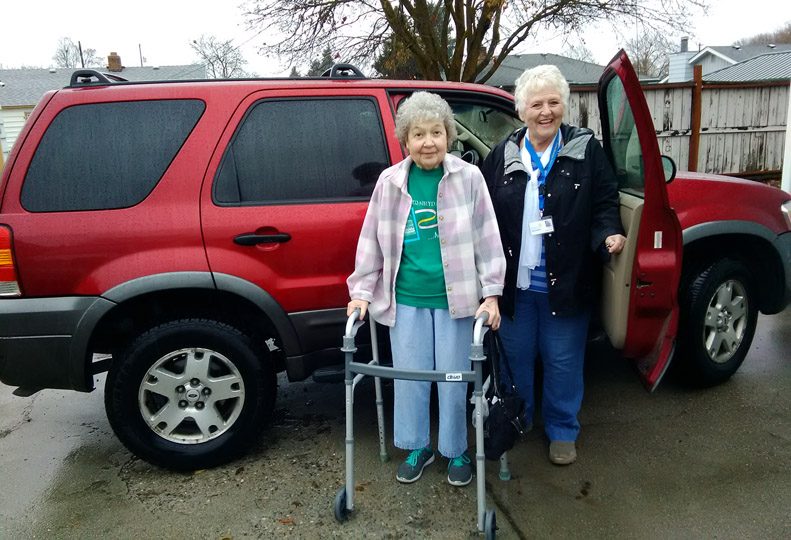Free to ride: Care Cars program delivers mobility
Service transports seniors, disabled to appointments

Jennifer Perkins was overwhelmed.
Her husband, David, had suffered a stroke and been diagnosed with dementia. Countless doctor appointments and medical tests stretched out before them, but Perkins had her own health issues, and she didn’t drive.
“I filled out the paperwork for paratransit (operated by Spokane Transit Authority),” she recalls.
But she knew with David’s mounting anxiety, dealing with the long rides and longer waits would be impossible to manage.
Then she heard about Care Cars.
Since 1984, the program operating under Elder Services, a division of Frontier Behavioral Health, has offered transportation to medical appointments for Spokane County’s at-risk seniors and disabled and isolated residents.
Program beneficiaries must be Spokane County residents ages 55 or older for seniors or 18 or older if disabled. Beneficiaries also must have low income and no other means of transportation.
Volunteer drivers have logged over 1.8 million miles and provided 155,000 trips since the program launched.
Perkins says the service was a godsend.
“The very first time they took us to an appointment, I thought, ‘Wow, this is going to be great,’” she says. “I was so fortunate with the drivers who helped us. They always treated Dave with dignity, no matter how his condition deteriorated.”
Unlike paratransit, Care Cars drivers take riders directly to their appointments and then take them home immediately afterward. There are no multiple stops or wait times for other riders.
For 2017, the program’s 49 volunteer drivers are on pace to provide nearly 900 rides—about 75 rides each month.
Volunteers are reimbursed for gas mileage and parking fees, and are given disabled parking placards to use when transporting riders.
When Nancy Cashon retired from Eastern Washington University four years ago, she wanted to stay active and involved in the community. She read about Care Cars in a Frontier Behavioral Health newsletter, and decided to volunteer.
It proved to be a great fit for her. She typically drives for Care Cars twice a week because she enjoys it so much.
“I love to drive,” she says. “And I love to hear about people’s lives. I think of my riders as so independent—they just don’t drive.”
At 73, she says she’s older than many of the people she transports, but Diane Roberson, who oversees the volunteers, says many college students earn their service learning hours by driving for the program.
“We look for people who enjoy driving and who are caring and kind,” Roberson says. “They can volunteer as much or as little as they like. Many college students have returned because they liked it.”
Volunteers are the lifeblood of Care Cars, says Mike Markus, director of Elder Services.
“I’d like to see the number of volunteers double,” he says. “We want to be able to serve every phone call we get.”
Markus says Elder Services hopes to begin offering incentives like oil changes and car washes to attract more Care Cars volunteers.
Drivers take passengers between 8 a.m. and 5 p.m., Monday through Friday. They use their own vehicles and can choose their availability.
Requirements to volunteer include a driver’s license, reliable vehicle, auto insurance, and a good driving record.
Volunteers must be 18 or older and agree to a criminal history background check. Drivers will receive orientation training and be screened for compatibility.
“I think this is a program that any large metro area could use successfully,” Markus says. “We’re funded by a grant from the Washington Department of Transportation, and receive federal 5310 funds from Spokane Transit Authority. We also received a smaller scale grant from Spokane Valley Rotary, and we’re very appreciative of it. However, Care Cars wouldn’t have made it this many years if it didn’t come under Frontier Behavioral Health, which has consistently supported the program.”
He notes that in 2015, the Spokane Regional Transportation Council recognized Care Cars as a regional priority project.
“We offer a service to a population that is unable to use paratransit or other services in Spokane County,” says Markus. “I can’t speak enough of how truly our volunteers care about the people they serve. They have hearts of gold, every single one of them.”
Jennifer Perkins concurs. Following her husband’s death in June 2016, she depended on Care Cars more than ever.
“It seemed like everything was falling apart around me,” she says. “I was a basket case.”
But the one thing she didn’t have to worry about was how she was going to make it to her medical appointments.
“Care Cars has been a lifeline for me,” Perkins says. “I’ve been thrilled with all the help they give me.”
Related Articles
Related Products




